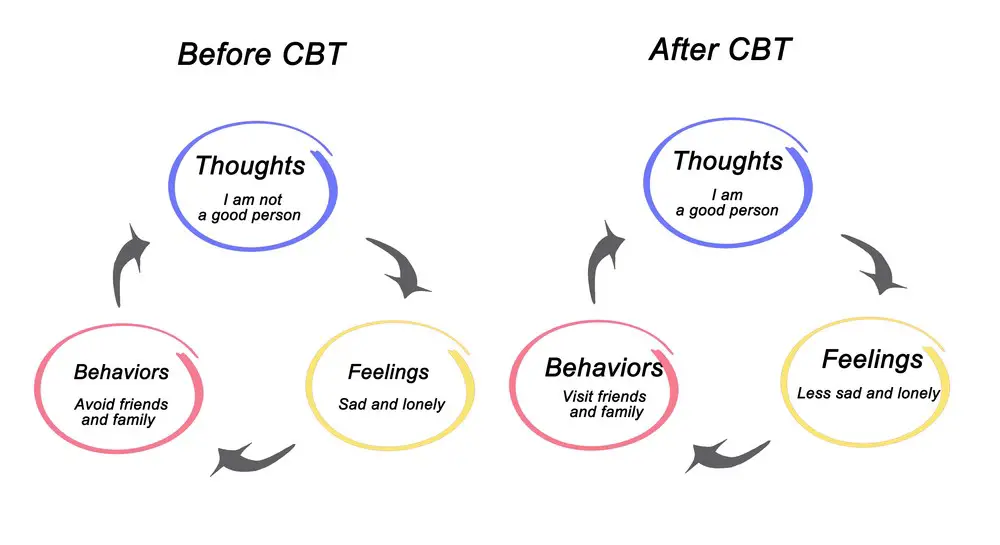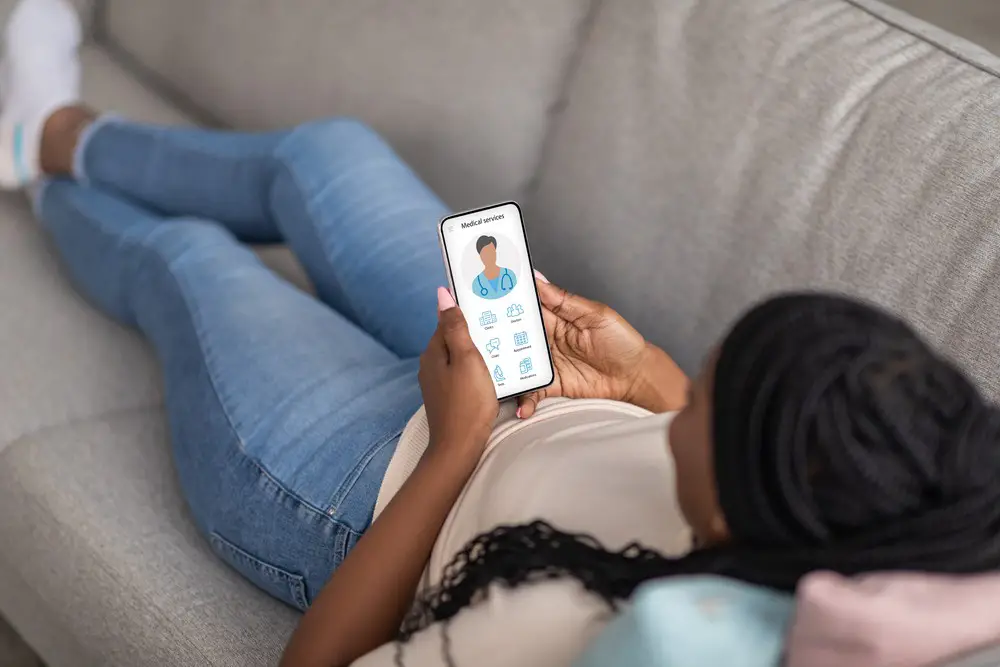As a BetterHelp affiliate, we receive compensation from BetterHelp if you purchase products or services through the links provided
In today’s digital era, accessing mental health care has become easier than ever, thanks to free therapy apps. These apps provide various tools and resources to address various emotional issues, including stress, depression, and anxiety. By offering high-quality mental health care without any associated costs, these apps enable users to access reliable therapy solutions without wasting time or money on traditional therapy. In addition, they also provide helpful features such as mood tracking and meditation exercises, which can significantly improve users’ overall well-being. With numerous options, here are some of the best free therapy apps for boosting mental health.
Key Takeaways
- Free therapy apps can make mental health care more accessible and affordable for many individuals.
- Top free therapy apps address various mental health concerns and offer valuable tools and resources.
- These apps often provide evidence-based practices, ensuring users receive reliable support.
Top Free Therapy Apps
7 Cups
7 Cups is a popular free mental health app that offers emotional support and online therapy. It is available for both Android and iOS devices. The app connects users with trained listeners and provides a supportive community for needy people.
Sanvello
Sanvello is a free app designed to help people manage their mental health, cope with stress, and alleviate anxiety. It is accessible on both Android and iOS platforms. Sanvello offers users a wide range of tools, including techniques based on cognitive-behavioral therapy (CBT) and mindfulness meditation.
Moodkit
Moodkit is an iOS app that aims to help people improve their mental health using tools based on CBT principles. It offers activities and exercises to help users enhance their mood and overall well-being. Although Moodkit is unavailable for Android devices, it is a valuable resource for iOS users.
Bliss
Bliss is a free journaling app designed to improve mental health and well-being using CBT techniques. It is available for Android devices and focuses on helping users develop a positive mindset through daily gratitude exercises, goal setting, and self-reflection.
I Am Sober
I Am Sober is an Android and iOS app that supports people overcoming addiction. It offers tools for tracking sobriety milestones and the ability to join an online community of individuals facing similar challenges.
MindShift
MindShift is a free mental health app on Android and iOS devices that helps users manage anxiety. It offers tools based on CBT to help users overcome their fears and confidently face anxiety-provoking situations.
Calm
Calm is a free app available on Android and iOS devices that focuses on relaxation and stress management. It offers guided meditation, sleep guidance, and breathing exercises to promote peace and well-being.
Headspace
Headspace is a widely recognized mental health app on Android and iOS platforms. It provides users various resources and exercises, including guided meditation, mindfulness, and breathing techniques, to help them manage stress, anxiety, and sleep issues.
Happify
Happify is a free mental health app for Android and iOS devices designed to help users overcome negative thoughts and improve their overall well-being. It offers a variety of evidence-based activities, games, and tools to foster a positive mindset and increase happiness levels.
PTSD Coach
PTSD Coach is a free app for individuals with post-traumatic stress disorder (PTSD). This app is available for Android and iOS devices and provides users with tools, resources, and coping strategies specifically designed for managing PTSD.
Benefits of Free Therapy Apps

Accessibility
Free therapy apps enable users to access mental health support anywhere, anytime. With nothing more than a smartphone or a device with an internet connection, individuals can access valuable resources and tools to help them manage their mental health concerns. This is particularly beneficial for those living in remote areas or with restricted mobility, making in-person sessions difficult or impossible.
Affordability
One of the key advantages of free therapy apps is that they offer an affordable alternative to traditional in-person therapy. Professional therapy can be costly, creating a barrier for many individuals needing support. Free therapy apps provide a way for people to access mental health resources without financial burden, making them more accessible to a broader audience.
Flexibility
With free therapy apps available 24/7, users can find support conveniently. Users can engage with the tools and resources these apps provide at a pace that suits their schedule. This flexibility is ideal for those with busy lives, time constraints, or inconsistent availability.
Anonymity
For some individuals, the anonymity provided by free therapy apps is an appealing feature. Users can feel more comfortable sharing personal information or discussing sensitive mental health concerns without fear of judgment. This anonymity may encourage more open and honest conversations, which can contribute to the effectiveness of the therapy.
Community Support
Many free therapy apps also offer a sense of community by connecting users with others experiencing similar mental health challenges. These communities can provide valuable support, encouragement, and understanding, helping users to feel less alone in their struggles.
By addressing these core aspects—accessibility, affordability, flexibility, anonymity, and community support,—free therapy apps are proving to be a valuable resource for individuals dealing with mental health concerns.

Addressing Mental Health Concerns
Anxiety
Free therapy apps can help individuals manage and alleviate anxiety symptoms. Tools such as MindShift offer resources and strategies to reduce worry and improve relaxation. Meditation apps like Headspace also provide guided practices tailored to managing anxiety, enhancing mental well-being, and promoting a more mindful approach to daily life.
Depression
Depression can be effectively addressed through therapy apps that target specific symptoms and provide coping mechanisms. Apps like MoodTools offer a range of resources, including mood tracking, thought diaries, and psychoeducation content, while some apps provide online talk therapy sessions to individuals struggling with depression.
Stress
Stress management is crucial to promoting mental health, and free therapy apps can be valuable tools in this regard. Meditation apps, like Headspace and Calm, often offer stress reduction techniques, including mindfulness practices, breathing exercises, and guided relaxation.
Trauma
Individuals with post-traumatic stress disorder (PTSD) can benefit from therapy apps to address trauma-related symptoms. PTSD Coach is an example of an app providing resources to understand and manage PTSD symptoms, including self-help tools and professional support options.
Addiction
Substance abuse and addiction are significant mental health challenges that can be addressed with specific therapy apps. Apps like Sober Grid and Nomo offer resources and support networks to aid users in their recovery journey, such as sober community connections, sobriety trackers, and motivation through milestones achievement.
Relationship Issues
Many therapy apps also target relationship issues by providing tools and strategies to enhance communication, emotional regulation, and conflict resolution within personal or professional relationships. Couples Counseling and Chatting is a popular app offering guided counseling sessions and communication exercises designed for couples to improve their relationships.
Features and Functions

Cognitive Behavioral Therapy (CBT)
Many free therapy apps focus on Cognitive Behavioral Therapy (CBT) as an evidence-based approach to improving mental health. These apps often provide users with informative resources, guides, and self-assessment tools to help identify and manage negative thoughts and behaviors. Some even offer personalized CBT programs tailored to the user’s needs.
Nature Sounds
Another feature found in therapy apps is nature sounds. Incorporating nature sounds into meditation or relaxation practices can help users achieve a more serene ambiance and reduce stress. Often, these apps allow users to mix and match sounds, adjust volume, and set timers for a customized experience.
Mindfulness and Meditation
Mindfulness and meditation practices are other key components of many free therapy apps. Users can find a variety of guided meditations, ranging from short sessions to longer practices. Some apps offer live chat options, enabling users to connect with professionals or fellow users for group meditation experiences.
Thought Journal
The thought journal feature in some therapy apps allows users to track and reflect on their emotions, thoughts, and experiences. By maintaining a journal, users can gain insights into patterns and areas of improvement. Many apps provide prompts or guidance to encourage users in their journaling journeys.
Crisis Text Line
For users experiencing a mental health crisis, some free therapy apps provide a Crisis Text Line. This feature connects users to trained crisis counselors who can provide support through text messages. Not only does this offer users a discreet and accessible way to seek help, but it can also alleviate the immediate burden of distress.
In conclusion, free therapy apps offer diverse features to enhance mental well-being. These range from cognitive behavioral therapy and nature sounds, to mindfulness, meditation, and more, providing accessible tools for users seeking to improve their mental health.
Alternatives to Free Therapy Apps
Employee Assistance Programs (EAPs)
Employee Assistance Programs (EAPs) are employer-sponsored services that provide employees with free, confidential support for personal or work-related issues. These services often include short-term counseling and referral services for more specialized mental health care. Contact your employer or human resources department to learn about EAP options available to you.
Telemental Healthcare
Telemental healthcare provides mental health services through technology, which usually involves videoconferencing, telephone or text-based communication. This alternative can provide more accessible, convenient support for individuals facing barriers to traditional in-person therapy. Many health insurance plans now cover telemental healthcare, so check with your insurance provider to learn about available services.
In-person Therapy
In-person therapy involves seeking support from a mental health professional like a psychologist, psychiatrist, or counselor. To find low-cost or sliding-scale options in your area, contact your local mental health board or community mental health center, or search online for therapists who offer reduced fees based on income. Your health insurance may also cover some therapy costs, so check with them for coverage specifics.
University Counseling Services
College or university students may have access to free or low-cost counseling through their school’s counseling center. These services typically offer short-term support for a variety of mental health concerns. Speak with your school’s counseling office to learn more about your options.
Frequently Asked Questions
Best depression apps?
There are several great apps available to help with depression. Some recommendations include Talkspace, which focuses on providing access to professional therapists, and Sanvello, aimed at stress relief and mood improvement. Both apps have free versions available.
Top iPhone therapy apps?
Many therapy apps are available on the iPhone. Examples include BetterHelp, offering talk therapy services, and Headspace, which focuses on mindfulness and meditation. Exploring various options is important to find the one that best suits your needs.
Free therapy apps on Reddit?
Reddit is a platform where users can share and discuss their experiences using different apps. You might find recommendations for free therapy apps by searching through relevant subreddits such as r/mentalhealth or r/anxiety, where users discuss their experiences with various therapy and mental health apps.
Student mental health apps?
Students can find mental health support through several apps catering to their needs. For instance, 7 Cups offers free emotional support and more structured therapy options, making it a great starting point for students seeking help.
Free CBT app options?
Cognitive Behavioral Therapy (CBT) apps provide useful tools for practicing healthy thought patterns and behavior changes. Free CBT app options include MoodKit and What’s Up, which offer helpful activities, resources, and exercises.
Therapy apps for teens?
Teens can access therapy apps such as 7 Cups, which provides counseling and emotional support, and Breathe, Think, Do with Sesame, to teach younger individuals effective coping mechanisms. Remember to explore various options to find the most suitable app for individual needs.
- Breaking the Silence: Why Men’s Mental Health Matters More Than Ever - April 15, 2025
- How to Transform a Home’s Patio Space into a Relaxing Space - March 23, 2025
- 5 Strategies to Use a Cell Phone to Help Manage Your Stress - March 23, 2025
This site contains affiliate links to products. We will receive a commission for purchases made through these links.



